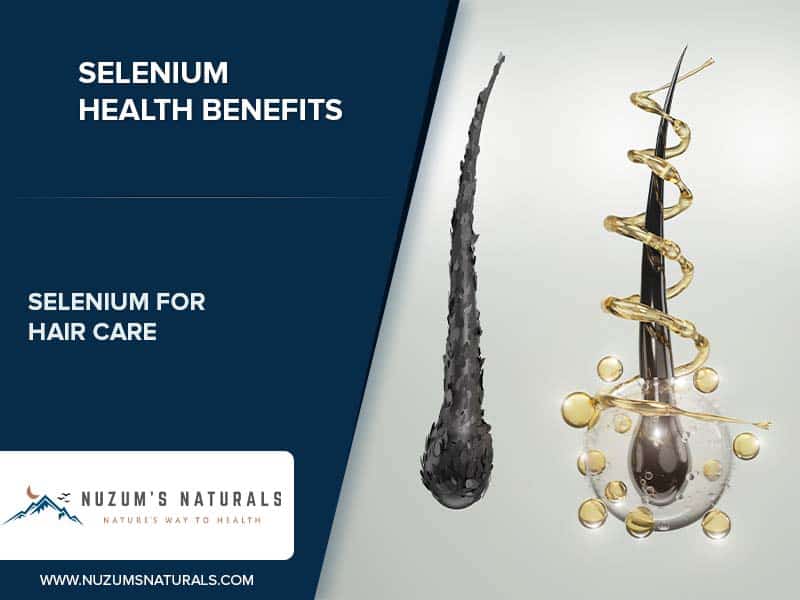Selenium is a mineral that has been shown to be beneficial to our health. We all know that it has antioxidant properties, but it also increases the longevity of our body and improves our immune system. It has also been shown to relieve asthma and help in the treatment of heart disease.

What Selenium Is
Selenium is a trace mineral found in soil, water, and some foods. Our bodies need only a small amount of it to remain healthy, but it plays an important role in our health. The human body does not make selenium naturally, so it must be obtained through food sources or supplements. Selenium can be found in some foods such as Brazil nuts, seafood, whole grains, and mushrooms. Supplementation is also an option for those who need to increase their intake of selenium.

Selenium For Hair Care
Selenium is a trace mineral that helps protect our health and hair. When the body lacks a proper amount of selenium, it can cause thinning hair, dryness, and dullness. But when it’s plentiful, selenium can help to stimulate hair growth and improve the condition of your scalp.
Selenium is a necessary component of our thyroid hormones, which promote healthy hair growth and reproduction. Without it, you can experience a wide range of problems, from dandruff to a deficiency of thyroid hormones. Another benefit is its ability to prevent oxidative stress on the hair follicles. This is a major factor in premature aging.

Selenium Improves Heart Health
Selenium improves heart health in a variety of ways, including boosting immunity and reducing oxidative stress. It also may help prevent the formation of plaque in the arteries. Several studies have shown that selenium is associated with a reduced risk of cardiovascular disease and some cancers.
Low levels of selenium are often found in people who have been diagnosed with heart failure. Low selenium concentrations are also linked to an increased risk of heart attack. That’s why it’s important to maintain adequate selenium levels through diet and supplements.

Selenium Increases Longevity
Selenium has been shown to increase longevity, which is why it has become a popular supplement. Studies have shown that taking selenium supplements can increase life expectancy by up to 10%. This is because of its powerful antioxidant properties, which help fight free radicals and slow down the aging process.
Selenium also helps protect our cells from oxidative damage, which can lead to premature aging and disease. It also helps boost our immune system, which is essential for protecting us from bacteria and viruses.

Selenium Relieves Asthma
Selenium has been shown to help provide improvement to asthma symptoms. Selenium deficiency is common among asthmatics. This may be because they can reduce oxidative stress, which is a symptom of several chronic diseases.
Asthma is caused by the inflammation of the lungs. Selenium helps reduce inflammation, which is helpful for those suffering from asthma. It also helps improve lung function and airflow, thus providing relief from the symptoms of asthma.

Antioxidants In Selenium
Selenium is a trace element that has antioxidant properties. These antioxidants help the immune system and prevent free radical damage and reduce inflammation. Selenium has been associated with a lower risk of cancer, particularly lung and breast cancer.
Antioxidants are important for protecting our cells from damage caused by free radicals. Free radicals can contribute to disease and have also been implicated in aging, so getting enough antioxidants is important for overall health and wellness.

Selenium Boosts Immunity
Selenium boosts immunity and is essential for the normal functioning of the body. Studies have shown that individuals with low serum levels of selenium have a higher risk of developing HIV. In addition, low levels of this trace mineral have been associated with increased incidences of autoimmune thyroid disease. Taking selenium supplements has been linked to lower rates of heart attack and death from cancer.
Selenium also boosts immunity by increasing the number of cells that fight disease-causing agents. This includes the lymphocytes, T-cells, B-cells, and plasma cells. Also, it inhibits pro-inflammatory cytokines that trigger allergic reactions. The effect of selenium on the immune system is thought to be due to the activity of seleno-proteins. These proteins are involved in DNA synthesis, reproduction, and thyroid hormone metabolism.

In conclusion, Selenium is an important trace mineral that has a number of health benefits. It helps prevent oxidative stress, protect against cardiovascular disease and cancers, enhance longevity, relieve asthma symptoms, boost the immune system and provide antioxidants. Selenium deficiency can lead to poor health outcomes so it’s important to maintain adequate levels in our bodies through diet and supplements.

